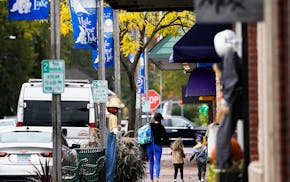A campaign to sell e-gambling to a skeptical state takes off this week as an electronic gambling road show hits the highway for a nine-city tour.
In Duluth on Tuesday night, about 35 charities and bar owners showed up for a chance to test-drive all the electronic pulltab and bingo games now available in Minnesota. They got tips from charitable gambling leaders and bars along the North Shore who use them. They received the latest data from state officials on Minnesota's most popular e-gambling counties, the effect on charity collections and more.
"I've seen the machines before, but I've never tried them," said Duluth bar owner Mike Ronning, checking out the electronic pulltabs. "It's fun. I just don't know if it's right for my place."
That ambivalence among bar owners and their charities prompted the first such tour in the state. Al Lund, executive director of Allied Charities of Minnesota, which organized the road show, said he's discovered a lot of misconceptions about the e-games. He called the meetings for bar owners and charities to resolve them.
Problems include misperceptions over state regulations, time needed to sell the games and where e-gambling taxes go.
"There's a misconception about how the stadium is being funded," Lund said at the Dry Dock Bar in Duluth.
For example, all charitable gambling taxes, from electronic and paper games, contribute to the state general fund and the Vikings stadium.
Some folks, Lund admits, want nothing to do with stadium funding. Charities also worry that stadium funding is taking away from their own budgets, "which isn't true."
Charities that adopted e-gambling have actually grown faster than charities that didn't, Bim Yang, an auditor at the Minnesota Department of Revenue, told the group. Charities embracing e-gambling saw a 23 percent increase in gross receipts, compared with 2.5 percent others, she said.
Obstacles remain
The folks who signed in at the event's registration table came from a cross section of charities: the Duluth Curling Club, Willow River Commercial Club, Virginia Elks Lodge, Camp Chicagami in Eveleth.
"Don't forget to take your red ticket," the woman at the sign-up table reminded them. "We'll do a drawing at the end of the night for an autographed football and autographed Vikings photo."
As participants checked out the electronic games, talked to their vendors and munched on pizza, Lund announced, "Our hope is by the end of the night, any questions you have will have been answered."
Ross Ferrell and Curt Oberg, owners of Roscoe's Pioneer Bar in Duluth, were among those in the crowd. They said they were curious about the games. But they had questions.
"I want to know how this will affect my bartenders," Farrell said. "If someone plays, how much time does that take away from my bartenders?
"And can we shut these down if we're really busy?"
'It's gotta be simple'
The possible tension between selling pulltabs and selling beer and food was mentioned frequently during the night.
But Michelle Tomling, gambling manager for the AMVETS Post 12 in Hibbing, told the audience members that if they can train the bartenders to be comfortable with the games, everyone wins.
"We had one bar where the bartenders flipped out because they had to sell e-tabs," Tomling said. "You have to work with personalities."
Some bar owners and charity managers who already have the e-games came to check out other games and compare notes. Darrin Goad and wife, Tammy, owners of Gopher Bar & Grill in Duluth, were among them.
"We're browsing, seeing what they have, how user-friendly it is," he said. "It's gotta be simple, or people will be intimidated."
The Goads' experience with e-games in their bar, supporting the Irving Community Association, "is going slower than we hoped," they said.
They've tried promoting the games, including a sign outside the bar and posters inside. How to attract a bigger crowd of players, and not monopolize the bartenders selling food and drink, is the challenge, they said.
Chris Mau, a supervisor at the Minnesota Gambling Control Board, told the group he's found other reasons people aren't signing up. Some charities don't think they need extra money: They're satisfied with their work, said Mau. Some say their customers don't want it. Some worry about reporting requirements and regulations, said Mau, who proceeded to tell the group that reporting electronic games was actually simpler than the paper ones.
Mike Domin, gambling manager for the Crosby-Ironton Quarterbacks booster club, listened with interest. His club, so far, hasn't signed up for electronic pulltabs or bingo.
"I just wanted to learn more about the games," he said.
Domin didn't leave the meeting as a convert to the cause, in part because folks at the three bars he works with aren't clamoring for the electronic games.
"But they might just attract more people," Domin said. "I think it will catch on."
Such sentiments are music to the ears of the folks organizing the tour. Next week, the tour heads to Fergus Falls, Willmar, Marshall and St. Cloud. The last stop is Fridley on June 24, when one lucky charity will be randomly selected to win a suite for 12 at the opening Vikings game this year, complete with $500 for food and drink.
"We want people to do what is right for their charities," Lund said. "We believe electronics is one more tool to help them."
Jean Hopfensperger • 612-673-4511

Shop the curbs for free on 'Trash to Treasure Day' in White Bear Lake

Longtime Uptown boutique closing in May

Meet the Athena Award winners: 103 female athletes honored by their schools

Lacrosse lists: 21 top players and the school that's No. 1 for boys and girls

